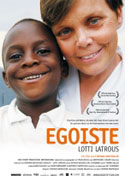

Opening 13 Nov 2008
Directed by:
Stephan Anspichler
Writing credits:
Stephan Anspichler
Egoiste, the documentary about Lotti Latrous who was named Swiss Woman of the Year in 2004, takes us back and forth from Lotti in the slums of Abidjan, Cote d'Ivoire (West Africa) to Cairo where her husband and youngest daughter live and in between to Switzerland where her two oldest children Sonia and Selim live and work.
Lotti lived a privileged expatriate life as the wife of Tunisian Nestlé manager Aziz Latrous. When Aziz was relocated to Abidjan, however, Lotti began to despise the life she was living because in the same city people were poor, sick and helpless. She began to help out in the Centre l'Espoir (Center of Hope), a clinic/hospice. The Centre l'Espoir receives about 120 patients each day, 10 - 20 of these patients are tested for AIDS and approximately half of these tests are HIV positive. At the final stage of their sickness, those dying of AIDS are not accepted by local hospitals and their only chance of a dignified death is to be cared for by Lotti and her colleagues. Seeing how Lotti helps the dying - whether by embracing an older scared woman or by reading to a motionless little boy - is more poignant than any film moment before. That is because naturally this is real life. She personally has experienced thousands of deaths.
Deciding to tend the ill and dying didn't come at an easy price for wife and mother Lotti. She was forced by her beliefs and calling to leave her husband and nine-year old daughter Sarah on their own in Cairo after the Nestlé stint in Abidjan was over. She just couldn't resolve not to do so (hence, the title Egoiste). Her family has actually learned to appreciate that. Aziz feels very married although they live separately. Sarah may still need some time to forgive her mother entirely, but the two older children who work in Switzerland very definitely feel that she is a hero, that they have learned from her. The pride in her son Selim's voice and eyes are intense.
This is very much the story of one woman but also the sad story of a continent. In the ’60s and ‘70s Abidjan was the "Paris of Africa". Now, after civil war and AIDS, poorer parts of the city (as well as the continent of Africa) are apparently hellholes. Centre l'Espoir is a refuge in this environment. (Thelma Freedman)